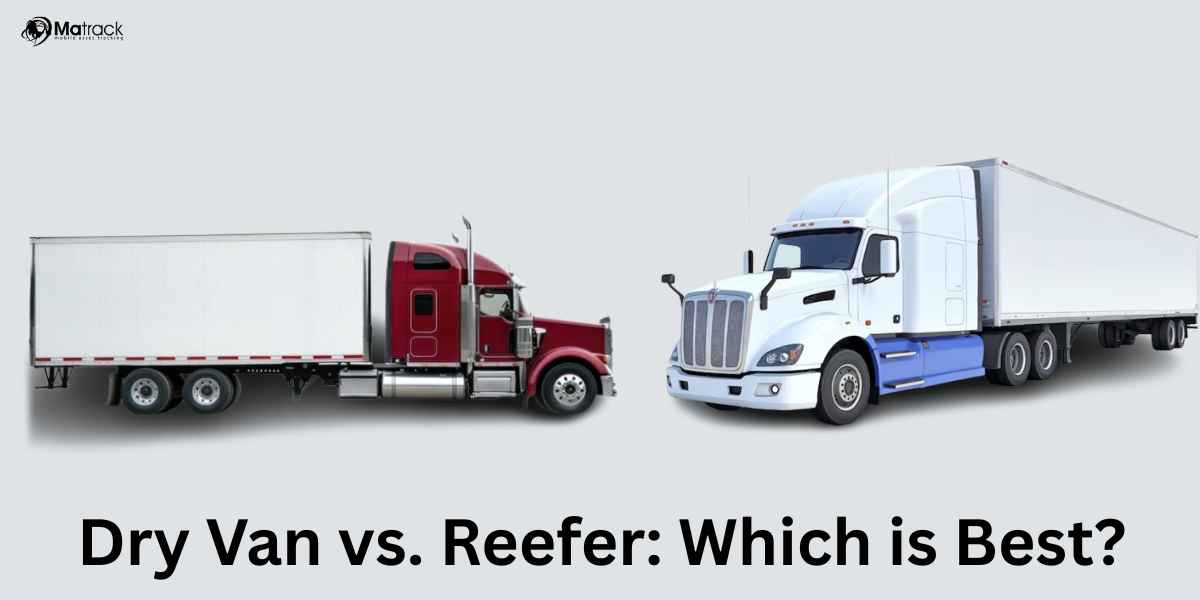Key Takeaways
- A dry van is best for moving dry, packaged goods that don’t need temperature control.
- A reefer is required for transporting perishable or temperature-sensitive cargo.
- Reefers cost more but allow higher load flexibility and premium-rate shipping.
- The better choice depends on what type of goods you ship and your operating budget.
What is a Dry Van Trailer?
A dry van trailer is an enclosed freight trailer used to transport non-perishable goods. It blocks external weather, dust, and theft. It lacks insulation and refrigeration. It moves electronics, furniture, and packaged items. It dominates dry freight hauling in North America.
Key Features of Dry Van Trailers
- Enclosed structure protects cargo from weather and theft.
- Standard size is 53 feet long, 8.5 feet wide, and 13.5 feet high.
- Wooden floors support palletized and non-palletized freight.
- Maximum cargo weight is 45,000 pounds.
- No insulation or refrigeration for temperature control.
- Rear doors allow dock-level loading and unloading.
Pros and Cons of Dry Van Trailers
| Pros | Cons |
| Protects cargo from external elements and theft | Cannot transport temperature-sensitive goods |
| Lower operating and maintenance costs | Prone to condensation damage on wooden floors |
| Widely available and easy to source | Limited to dry freight only |
| Compatible with most freight docks and warehouses | No humidity or climate control |
| Suitable for a wide range of dry goods | Requires careful packaging to avoid load shift |
What is a Reefer Trailer?
A reefer trailer is a refrigerated freight trailer used to transport temperature-sensitive goods. It contains an insulated body and a refrigeration unit. It maintains internal temperatures between -22°F and 95°F. It transports food, medicine, and chemicals. It ensures cold chain integrity in long-distance shipping.
Key Features of Reefer Trailers
- Insulated structure retains internal temperature.
- Refrigeration unit controls temperature from -22°F to 95°F.
- Diesel-powered cooling system maintains operation during transit.
- Aluminum or metal floors support easy cleaning and drainage.
- Multiple compartments allow different temperature zones.
- Built-in vents and airflow systems protect cargo quality.
Pros and Cons of Reefer Trailers
| Pros | Cons |
| Maintains temperature-sensitive cargo conditions | Higher maintenance and fuel costs |
| Enables transport of both perishable and dry goods | Requires regular refrigeration unit servicing |
| Expands market access with cold chain capability | Prone to breakdown if not monitored |
| Offers higher freight rates and revenue potential | Heavier trailer reduces payload capacity |
| Complies with food safety and pharma regulations | More complex to operate and load than dry vans |
What is the Key Difference Between Dry Van and Reefer Trailers?
The core difference is temperature control. Dry van trailers carry non-perishable goods without regulating internal climate. Reefer trailers transport temperature-sensitive freight using onboard refrigeration systems.
Dry vans protect cargo from weather, but not from heat or cold. Electronics, clothes, and packaged items move well in dry vans. Reefers maintain specific temperatures for food, medicine, and perishables.
Reefers handle both cold and dry freight. Dry vans only move dry cargo. Reefers need fuel and servicing for their cooling units. Dry vans operate with lower costs and simpler maintenance.
Choosing between them depends on cargo type. Dry vans fit general freight. Reefers suit critical temperature-controlled shipments.
Which Trailer Is Best: Dry Van or Reefer?
When to Choose a Reefer
Reefer trailers are best for transporting perishable, high-value, or temperature-sensitive freight. They maintain strict temperature control, support cold chain compliance, and access premium-rate loads. Reefers handle pharmaceuticals, dairy, meat, and frozen foods.
When to Choose a Dry Van
Dry van trailers are best for general-purpose, low-maintenance, and cost-efficient freight hauling. They transport electronics, furniture, textiles, and retail goods. Dry vans require less fuel, have simpler upkeep, and cover the majority of dry freight needs.
Which Offers More Flexibility
Reefers carry both cold and dry cargo. Dry vans carry only non-perishable goods. Reefers reduce empty miles and increase load opportunities. Dry vans lower operating costs and simplify dispatch.
Final Decision
Reefers are better for specialized, high-margin freight. Dry vans are better for high-volume, low-cost operations. The best trailer depends on cargo needs, cost structure, and growth goals.



